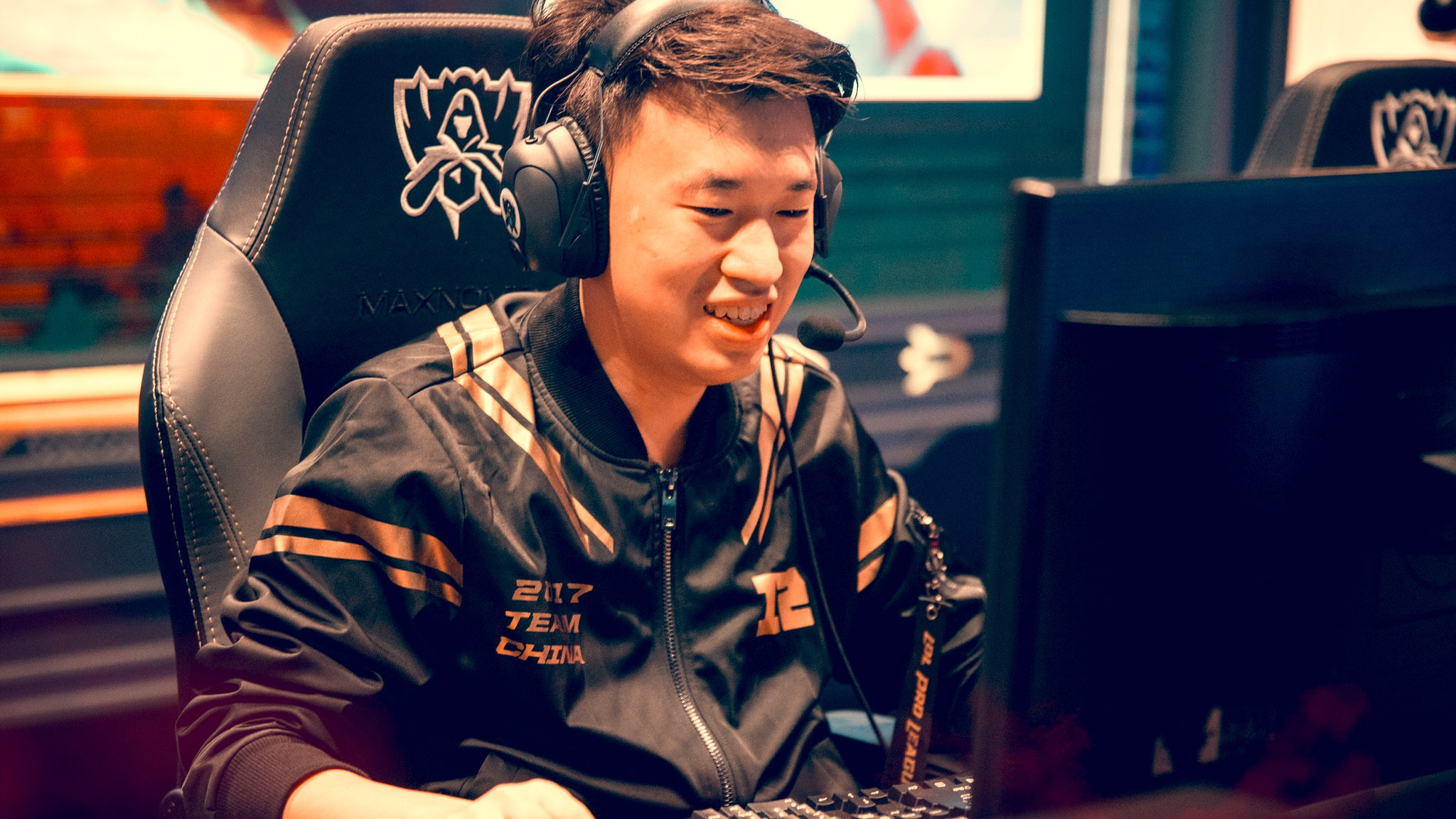
Known as Xiaohu among gamers, Li Yuanhao is familiar among fans of League of Legends. /Riot Games Photo
Known as Xiaohu among gamers, Li Yuanhao is familiar among fans of League of Legends. /Riot Games Photo
Wake up at 1 p.m., start training, take a short break at 7 p.m., and then continue training until 3 or 5 a.m. the next morning. This is the daily routine for Li Yuanhao, a professional video gamer, a new job that didn't exist 10 years ago.
"I started playing video games when I was five," Li recalled, "I found I could easily get a better score than others."
In 2012, he began to play LoL, or League of Legends, one of the world's most popular video games, released by American company Riot Games in 2009. The next year, he became one of the game's top-rated players in China.
06:56

"It was then I realized I can make a living out of gaming," the 21-year-old told CGTN.
But the decision to drop out of school to play games was quickly met with fierce opposition from his parents, who viewed it as a bizarre lifestyle, especially for Li, who was 16 at the time.
To persuade his parents, the teenager made a bold move. He ran away from home for two months to prove he could live on his own – an act he now calls "a bit extreme." Eventually, he joined a professional team in 2014 and began his gaming career.
Five years after that, Li became a LoL pro player for RNG (Royal Never Give Up), a video game club in China. Furthermore, he and his team members, together with gamers from two other pro teams, FunPlus Phoenix and Invictus Gaming – which won the 2018 League of Legends World Championship – are representing China in the 2019 LoL World Championship held in Europe. Known as Xiaohu among gamers, Li is familiar among LoL fans. And his parents' view towards his career path has now changed.
"They never miss any competition I attend. Sometimes, they play video games themselves when they're tired," said Li.
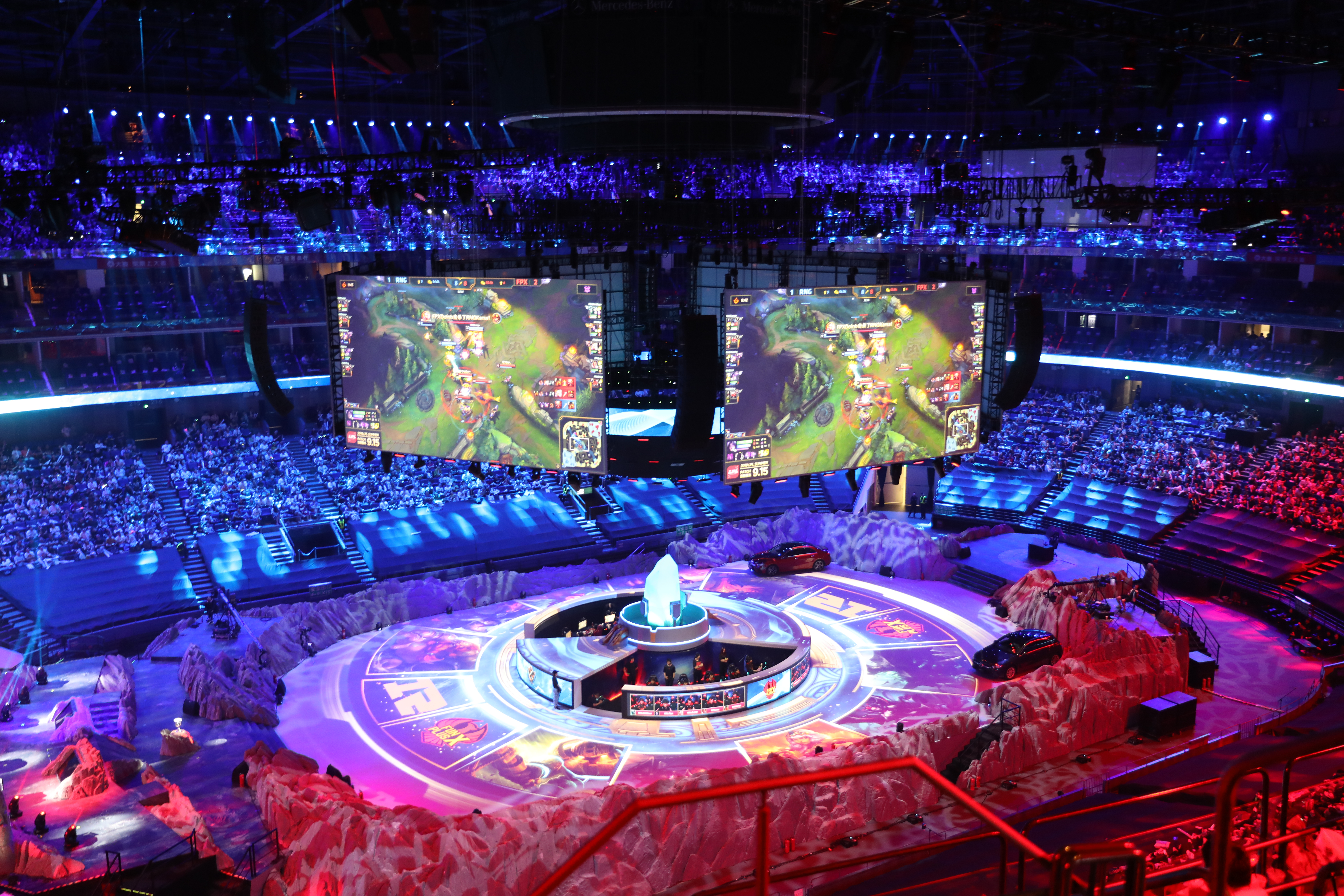
League of Legends fans are watching watch the 2018 League of Legends World Championship Finals on September 6, 2019, Shanghai, China. / CGTN Photo
League of Legends fans are watching watch the 2018 League of Legends World Championship Finals on September 6, 2019, Shanghai, China. / CGTN Photo
The story of Li Yuanhao comes with the boom of esports in the past decade. As a branch of video game culture, esports refers to a multiplayer video game played competitively for spectators, most by professional gamers. The industry though, started quite early with the first video game competition "the Spacewar" held at Stanford University in 1972. Since then, it has gone through tremendous growth thanks in part to the popularity of online streaming services.
A report by Tencent, China's largest gaming company, suggests there were 390 million esports users worldwide in 2017. China alone accounts for more than 64 percent.
The growth shows no signs of slowing. Market research firm Newzoo estimates that global esports economy will top one billion U.S. dollars for the first time in 2019, with a year-on-year growth of more than 26.7 percent, and it is expected to reach 1.8 billion U.S. dollars by 2022; 3.2 billion U.S. dollars is a more optimistic projection. Meanwhile, thanks to its huge fan base, China is expected to generate 210.3 million U.S. dollars in 2019, overtaking Western Europe as the second-largest region in terms of revenue, just after North America, at an estimated 409.1 million U.S. dollars.
06:40
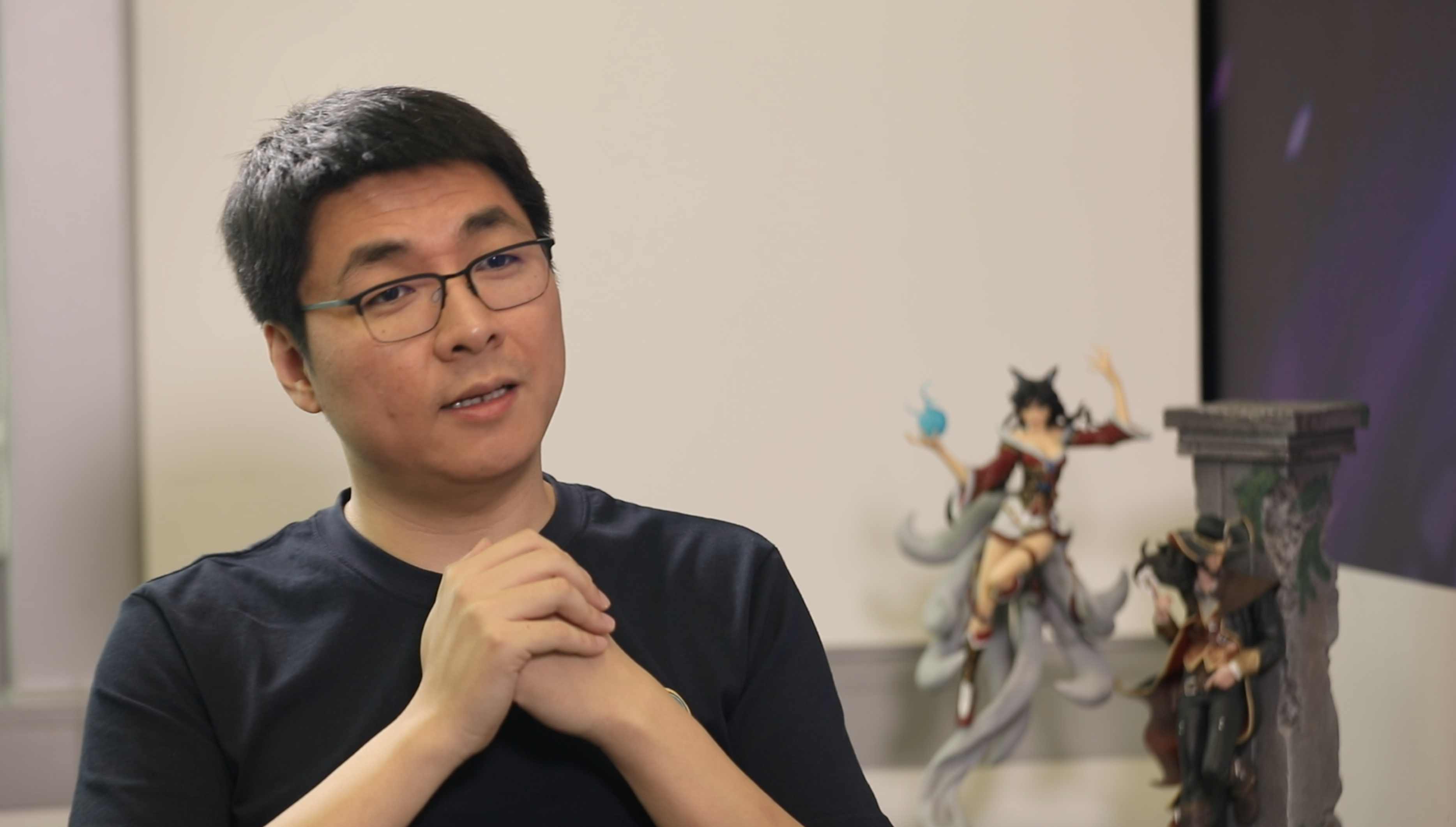
"I would say esports is the fastest growing business in China," says Leo Lin, co-CEO of TJ Sports, a joint venture between Riot Games and Tencent, which operates the professional League of Legends competitions in China.
"Last year, the peak number of viewership for one single match we had last year for Worlds was close to one million unique viewers, and it doubled every year, growing at more than 60 percent in the past five years. So did our revenue," added Lin.
In January 2019, Riot Games partnered with Tencent to establish TJ Sports.
"Riot Games had worked with Tencent for years to promote LoL. But esports grew so fast that it's no longer merely a project for both companies. That's why we decided to operate under one roof, to gather the resources and power we have to grow the pie bigger," said Lin.
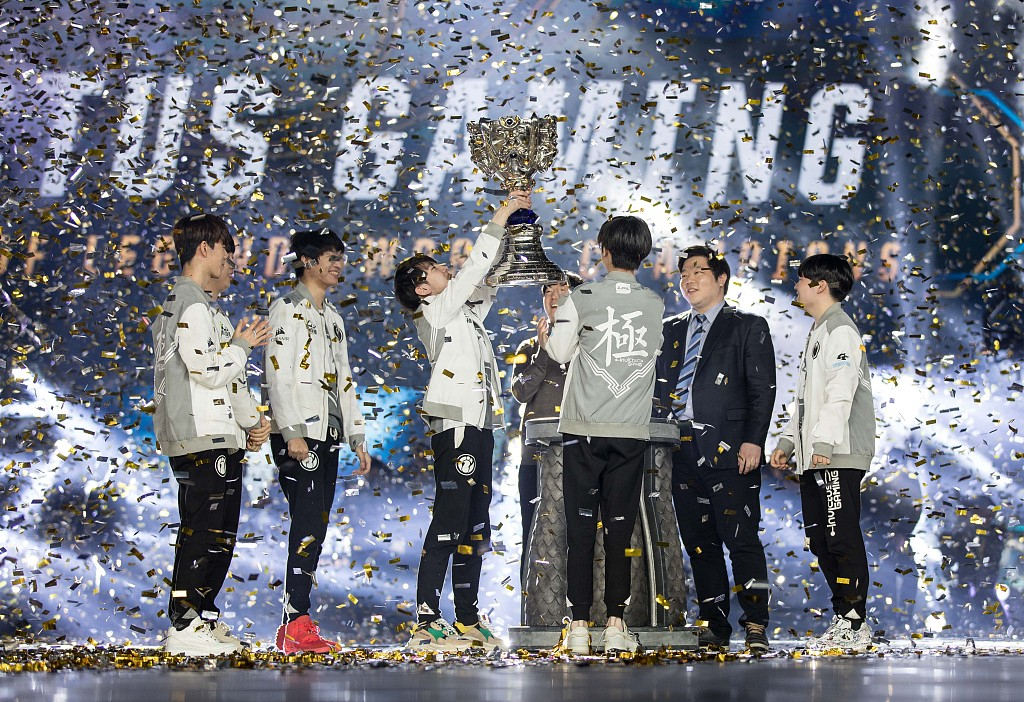
Invictus Gaming wins the 2018 League of Legends World Championship sponsored by Mastercard on November 3, 2018, in Incheon, South Korea. / VCG Photo
Invictus Gaming wins the 2018 League of Legends World Championship sponsored by Mastercard on November 3, 2018, in Incheon, South Korea. / VCG Photo
Leading brands are also flooding in. Mercedes-Benz, Nike and KFC quickly established partnerships with TJ Sports to tap into the booming industry. Government and higher education institutes also joined. Shanghai announced an investment of five billion yuan (700 million U.S. dollars) over the next three years to support the local gaming and esports industry. Hannan issued a similar plan, announcing an esports development fund of one billion yuan (145.6 million U.S. dollars). Gaming has become a team sport at more than 900 universities across China. In 2017, Communication University of China in Beijing was the first university to allow students to major in esports.
However, the path for esports is not without obstacles. The term is new for many. In fact, it was not included in the dictionary until 2015. Many found it hard to distinguish the new concept from video games, questioning whether or not it shares the risk of developing into an addiction.
"They're different. Video games is like you play basketball while esports is like watching the NBA. One is amateur, the other is professional," said Lin.
"In fact, one Chinese pro team did an experiment last year. They invited a group of kids, who wished to become pro gamers someday, to spend one week with the team. Those kids needed to practice, just like a pro gamer. In the end of that week, all kids dropped out and said they would never touch the game they played again, "he said.
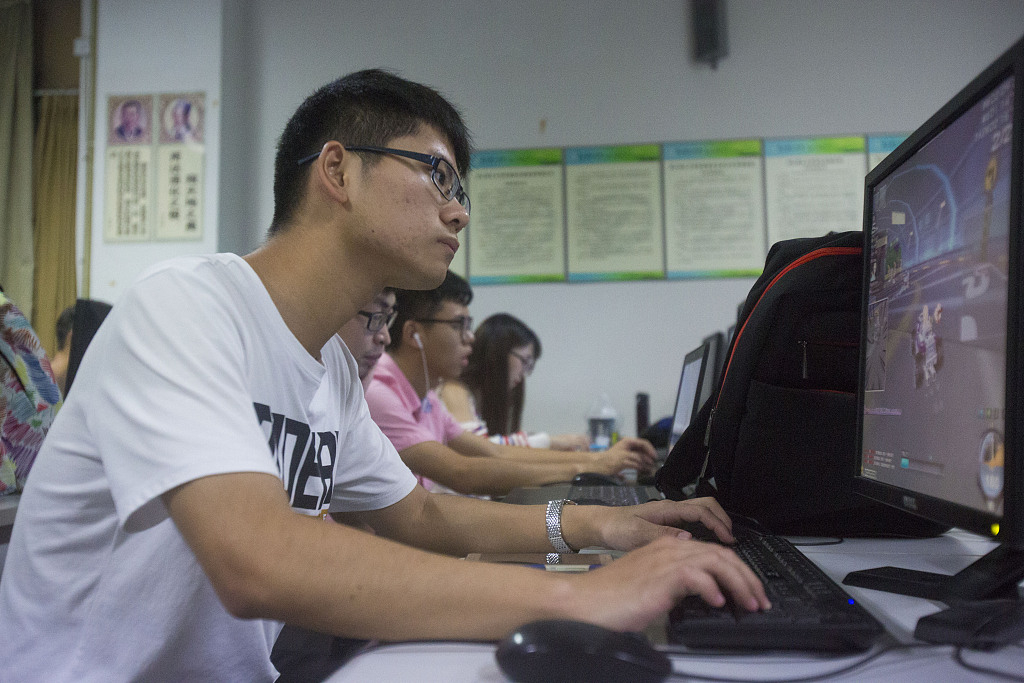
Students from a colleage in Hangzhou play video games at an esports class on October 10, 2017, Hangzhou, Zhejiang. /VCG Photo
Students from a colleage in Hangzhou play video games at an esports class on October 10, 2017, Hangzhou, Zhejiang. /VCG Photo
Some also question the career length of esports players – labelling the new profession as: Get big money, burn out and retire young, given that most gamers quit the job before turning 25.
"The question of post-gaming life hangs over me almost every day, "admitted Li. "I believe performing better to have a more competitive career would be helpful. With the esports market continuing to grow, I should find other opportunities, like being a game presenter. "
Moreover, there is no consensus whether or not esports is a real sport, though some argue the new industry shares some similarity with traditional sports: Talent, passion, training, resilience, teamwork, physical and mental strength. Last August, the International Olympic Committee ruled out the possibility of including esports as a medal event at Olympic Games in the near future, saying "competitive gaming" should "entail physical activity, which can be compared to that required in more traditional sports." But the door is not completely closed, as IOC added it needs further study.
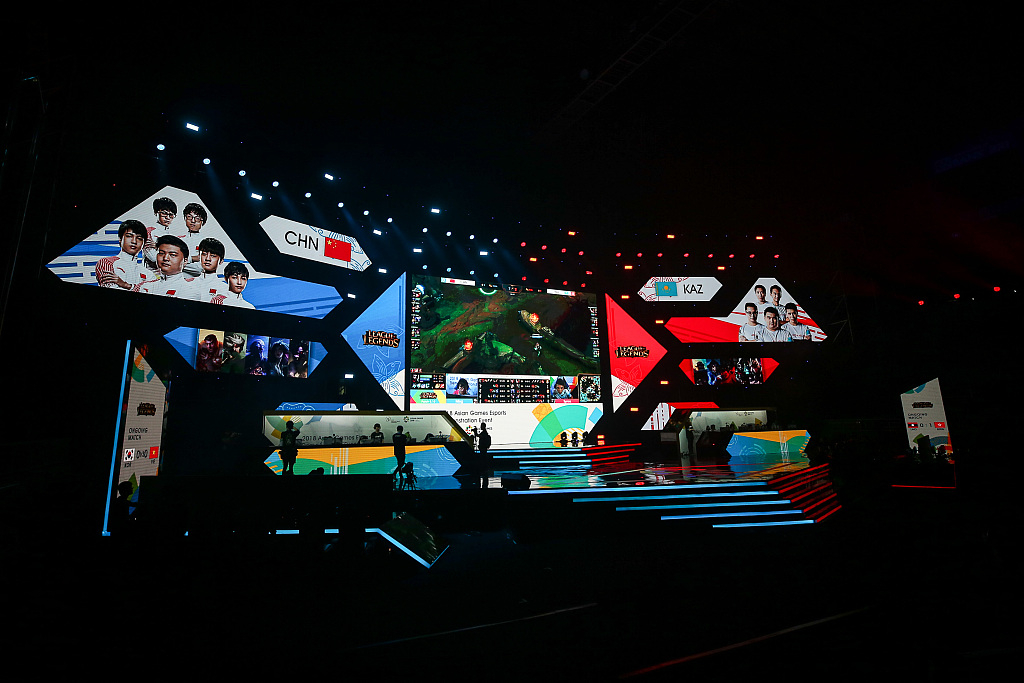
The Chinese team battle against Thailand at the eSports "Arena of Valor" tournament as an exhibition sport at the 2018 Asian Games in Jakarta on August 27, 2018, ahead of its entry as a medal event at the next Asian Games in China in 2022. /VCG Photo
The Chinese team battle against Thailand at the eSports "Arena of Valor" tournament as an exhibition sport at the 2018 Asian Games in Jakarta on August 27, 2018, ahead of its entry as a medal event at the next Asian Games in China in 2022. /VCG Photo
"For NBA and FIFA, they have existed for 50 years. So they have already set up rules, processes, and have defined boundaries, "said Lin.
"Well, for esports, a lot of areas or boundaries haven't been fully defined yet. We need to learn from traditional sports: How to operate a league, how to set up a rule, how to ensure the competition is clean, how to ensure players can obtain good physical training. "
But whether esports will be deemed a sport or not by IOC or the public, it seems of little concern to the industry. The change in attitude of Li's parents tells a simple story: After years of isolation, esports is finally emerging from its niche.
"I know there's a lot of debate on the understanding of the industry. But I believe with more understanding and more conversations, there will eventually be more trust, instead of the other way around, "said Lin.